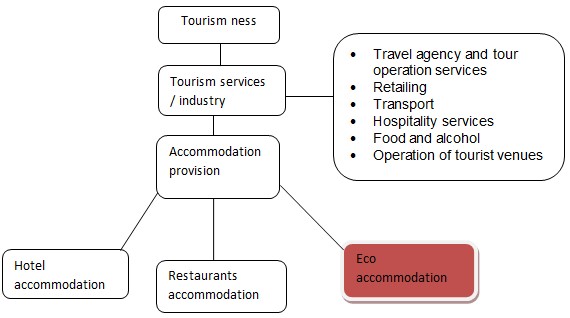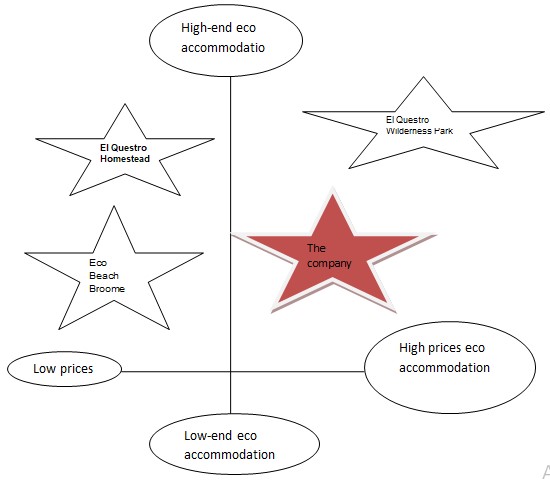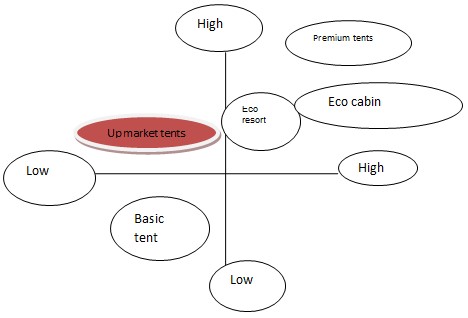Executive Summary
The report shows Kimberly, Western Australia is underserved market that requires eco accommodation because only Eco Beach Broome offers such eco accommodation despite the rising demands for eco accommodation.
The industry environments are favourable to new entrants while the market demands for supply of eco accommodation. The company will develop various product and service categories to cater for the middle-income class that has grown and has disposable income. The company will position itself and products as affordable eco accommodation for the middle class in Kimberley. However, the company must create awareness about quality, product features, and pricing of its products to both domestic and international markets. All marketing strategies will help the company to achieve success in the eco accommodation industry.
Reflection
This report has presented the basic elements of marketing activities learned in classroom and their real-life application. It allows students to understand how firms use marketing principles to launch new products to exploit a market segment or develop products for a given market segment.
Introduction
This report presents a marketing plan for a group of four Aboriginal people from Fitzroy Crossing, Kimberley (north, Western Australia) who would like to start their own tourist accommodation business. The report shows the current competitive environment at Kimberly. Hence, the new business must offer unique products and services that other competitors do not have. Moreover, the company will offer novel accommodation products, which will attract many people to the region and increase the company’s market share (Jones Lang LaSalle, 2013). The report presents eco accommodation as the best tourism accommodation business for the investors.
Industry definition
Tourism business involves the provision of services to both international and local visitors. Visitors’ main goals may include private and government business activities, conferences, leisure activities, and informal visits. Accommodation is a critical part of tourism business, which visitors need while in Australia. As a result, accommodation provision is a viable business option for the investors.
According to Tourism Australia, Australia is among the largest tourism markets in the world, and it is quickly evolving to a major destination for business travellers and investors (Tourism Australia, 2013b). Australia positions itself as the world’s strongest tourism destination with the largest means of aviation transport, secure, safe, and environmental friendly destination for visitors.
The company will engage in eco accommodation as a viable and alternative accommodation to the traditional hotel and restaurant accommodation. The company has chosen this accommodation niche because it can promote eco accommodation globally to environmental conscious visitors. Eco accommodation will have a greater potential of advancing, and it will likely to attract visitors from major markets. This will improve chances of the business growth in Western Australia. Moreover, it will open up new opportunities for tourism in the region.

Analysing Marketing Opportunities
Competitor Overview
Although competition exists in this segment of the market, anecdotal evidence shows that Western Australia has a huge potential for eco accommodation services (Tourism Research Australia, 2011). It could have high demand from eco retreat visitors. Existing competitors offer eco accommodation and various services available in Western Australia, Kimberley.
In Kimberly, Eco Beach Broome provides eco style accommodation and nature style accommodation. Visitors can enjoy the natural beauty of the area from this service provider. Eco Beach Broome will be the major competitor of the company.
However, the company will also face fierce competitions from other service providers in Western Australia. El Questro Homestead will also be a major competitor in the eco accommodation niche. The service provider aims to provide contemporary experiences to visitors accompanied with modern elements of accommodation. Finally, the company will also face competition from El Questro Wilderness Park. This eco accommodation provider claims the unique position in the world when it comes to Australian holiday experiences. It has a huge unexplored natural environment (Australia Tourism Guide, 2011).
The company will have to define new products, which these competitors do not have or have but have failed to utilise effectively for best tourists’ experiences.
Macro Environmental Analysis
Nearly all the DENTPC factors affect eco accommodation in different ways. Hence, they are critical for consideration in the new eco accommodation business.
Demographic Environment
There is a growing population in Australia, particularly among young consumers who still like visiting and experiencing the natural beauty. They provide a rich market for the company. The growth and the size of the populations have increased steadily. Moreover, the number of international visitors has increased in the past few years. These visitors are of different age groups and income status. Hence, the company will use pricing strategies that would account for all potential customers.
Economic Environment
In the past few years, the global tourism, including Australia tourism has experienced tough times. The global financial crunch affected international tourists while the number of domestic tourists declined remarkably. The high dollar exchange rates did not favour the local market. In addition, there were also discounted airline costs to overseas. These economic factors could affect the industry and the new venture by eroding profit margins. Economic environments affect the number of travellers who may cancel their holiday plans (Kotler, Veronica, Saunders and Armstrong, 2005).
However, the present conditions are favourable, and the industry is likely to perform well. The purchasing power has improved and consumer confidence has increased due to savings and current favourable prices. The company will be keen on the major trends that predict tourists spending habits and staying patterns.
Natural Environment
The company will observe the level of pollution in Kimberley and its impacts on tourism. In addition, it will be keen on the role of the government on promoting both local and international tourism. The new company will base its eco accommodation service on clean, unexplored, and non-polluted environments and places.
Technological Environment
Technology affects all industries, including eco accommodation. The company will use new technologies and products that offer advanced and superior services to visitors. This would ensure the highest customer satisfaction and repeat business for the company. On this note, the company will look for both minor developments and major breakthroughs in technologies for eco accommodation services. Technologies can have long-run impacts in the industry.
The company will use technologies, including social media to promote its eco accommodation services online (Nusair, Bilgihan and Okumus, 2012).
Political and Legal Environment
Western Australia is a peaceful state. Hence, the new venture will thrive without political threats. The political leadership will to promote the Aboriginal culture to enhance tourism activities in the region and the need for eco accommodation to protect the environment.
The company will also focus on changes on environmental laws, which will have impacts on eco accommodation. In addition, it would evaluate all local, state, and federal laws that guide eco accommodation and relations with the local Aboriginals, authorities, environmentalists, tourists and other stakeholders in order to avoid legal battles.
Social or Cultural Environment
The company will provide eco accommodation in Kimberley because of the rich, unspoiled Aboriginal cultures, beliefs, norms, and values. It will aim to protect the local cultures and social environments in order to grow a sustainable business. Social activities are parts of the unique products, which visitors come to experience in Kimberley (Daldeniz and Hampton, 2012).
Consumer Behaviour Analysis: DMP
DMP is a complex process for many consumers (Solomon, 2006). Tourists will have the desire to visit Kimberley, Western Australia to experience the local culture (Tourism Australia, 2013a). This is a need to satisfy. The tourist has realized his or her travel needs. The tourist has not satisfied the needs, and he or she wants to improve his or her perceived desires. The tourist has the need to book for accommodation due to internal triggers and desires to experience Aboriginal cultures and relax. He or she also recognises the need to have an eco accommodation in order to protect the environment. The decision-making process of the consumer begins because of the motivational factors from both internal and external triggers.
Motivations to satisfy these needs lead the tourist to search for relevant information regarding eco accommodation in Kimberly. The consumer can rely on experiences or memory in order to obtain relevant information.
The search for relevant information about eco accommodation in Kimberly and Western Australia may yield several alternatives. As a result, the consumer will make a choice among the options. Consumer may use different criteria to choose the most preferred eco accommodation. These may include, pricing, available services, service quality, and proximity to tourism activities among others.
Once the customer has picked on the best eco accommodation i.e., eco accommodation from the new company, he or she will be ready to make the purchase. However, the purchase decision may change due to prevailing condition. For instance, the customer may have insufficient funds, if all eco accommodation places are all occupied, bad weather or an influence from an associate or a family may make the tourist to change his or her decisions about the intended eco accommodation booking at the new company. Otherwise, the consumer will proceed to book for the eco accommodation from his or her chosen eco accommodation service provider.
Finally, the tourist will conduct an after-purchase evaluation to determine if the accommodation offers value for money. On this note, the new company must strive to provide the best services to their customers.
Further marketing research required
The new company will have to conduct further research on consumer perception about eco accommodation (Kotler, Bowen and Makens, 1999). For instance, consumers may perceive eco accommodation as expensive relative to other premium accommodation services. On the other hand, some consumers may perceive eco accommodation as cheap tents. On this note, it is imperative for the company to create awareness about eco accommodation in both domestic and international markets. Moreover, the company must emphasis features and prices of eco accommodation in its campaigns.
Constant product development requires further research. The company must not offer basic eco accommodation available in other markets. Instead, it must develop various products, which will motivate consumers to consider eco accommodation. For instance, the product should offer nature-based experiences, a sense of tranquillity, and products based on green concepts. It could offer basic eco tents, upmarket eco tents, eco cabin or lodge, and eco resort (Tourism Research Australia, 2011).
A study by Tourism Research Australia found out that many consumers from the target markets did not consider eco accommodation as a major attraction (Tourism Research Australia, 2011). Hence, the company will research on product features, what luxury consumers seek, travel destinations, and biggest features that influence consumer purchase decisions.
Selecting Target Market(s)
Justification for choice of segmentation base
The company will focus on income segmentation because many consumers had various concepts about pricing of eco accommodation. This would allow the company to offer various eco accommodation products and services for various income categories.
Profile of the income segment
Target market choice and justification
The company will focus on the middle income consumers because they have disposable incomes, would like to explore nature and spend freely.
- Segment size: this is the largest and rapidly expanding segment of the market
- Segment growth: middle class consumers present huge growth potential for the company
- Segment profitability: high number of consumers will lead to profitability
Proposed positioning strategy


The company will capitalise on the middle-income class and position itself against competitors as affordable luxury provider. This will allow the company to provide luxury services to the growing middle class in both domestic and international markets. Hence, tourists would be able to experience Aboriginal cultures and Australia green and clean nature-powered accommodation at affordable rates. The company will position its products to cater for various eco accommodation needs of upper and premium classes.
The company will market eco accommodation as an affordable luxury product for experiencing the unique Aboriginal culture and environment.
Designing Marketing Strategies
Proposed Marketing objective
To achieve 30 percent of the eco accommodation market share in Western Australia by June 2014.
Marketing Strategies
- Pricing: fair prices for the middle class
- Product: eco friendly and luxurious products for various market segments with features that range from basic to premium high quality finishes
- Place: the company’s services will be available in eco friendly environments and close to communities who provide cultural services to tourists
- Promotion: the company will use both traditional and social media for promotion as the best, affordable, and environmentally conscious eco accommodation provider
- People: all stakeholders would be critical for the success of the business because they will all add value to the company
- Processes: efficient process to enhance tourists’ customer experiences (Sfandla and Björk, 2012)
- Physical evidence: neat, clean, and luxurious eco accommodation tents, cabins, and resorts with high quality and premium finishing (Brassington and Pettitt, 2005)
Conclusion
The company should proceed and implement the eco accommodation services because there is only one service provider in Kimberly. Moreover, the demand for eco accommodation has increased while other service providers are in other regions of Western Australia. The company’s future marketing activities must focus on product differentiation and pricing strategies.
Reference List
Australia Tourism Guide 2011, Kimberley Eco and Nature. Web.
Brassington, F and Pettitt, S 2005, Essentials of Marketing, Pearson Education Limited, Essex.
Daldeniz, B and Hampton, M 2012’, Dive Tourism and Local Communities: Active Participation or Subject to Impacts? Case Studies from Malaysia’, International Journal of Tourism Research, vol. 15, no. 5, pp. 507–520. Web.
Jones Lang LaSalle 2013, Greenfield Study into Short Term Accommodation Development in Australia. Web.
Kotler, P, Bowen, J and Makens, J 1999, Marketing for Hospitality and Tourism, Prentice-Hall, New York.
Kotler, P, Wong, V, Saunders, J and Armstrong, G 2005, Principles of Marketing, 4th edn, Pearson Education Limited, Essex.
Nusair, K, Bilgihan, A and Okumus, F 2012, The Role of Online Social Network Travel Websites in Creating Social Interaction for Gen Y Travelers’, International Journal of Tourism Research, vol. 15, no. 5, pp. 458–472. Web.
Sfandla, C and Björk, P 2012, Tourism Experience Network: Co-creation of Experiences in Interactive Processes’, International Journal of Tourism Research, vol. 15, no. 5, pp. 495–506. Web.
Solomon, M 2006, Consumer Behavior, Prentice Hall Europe, New Jersey.
Tourism Australia 2013a, Aboriginal Experiences in Western Australia.
Tourism Research Australia 2011, Destination Visitor Survey Strategic Regional Research – Western Australia: Eco accommodation product development research: Summary of results, Tourism Research Australia, Canberra.